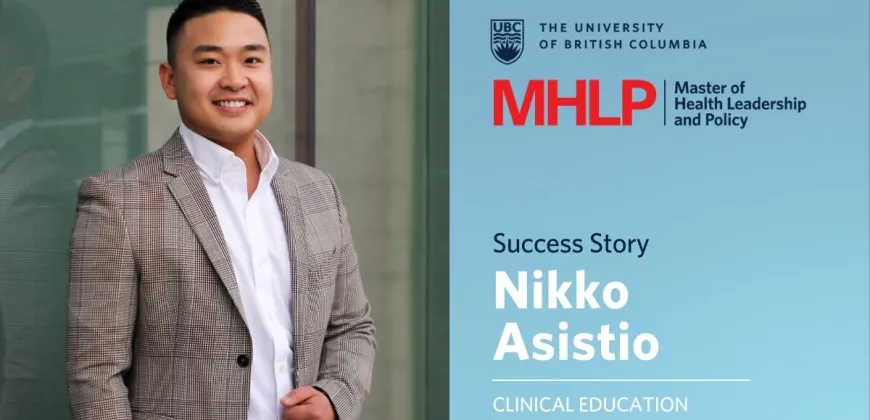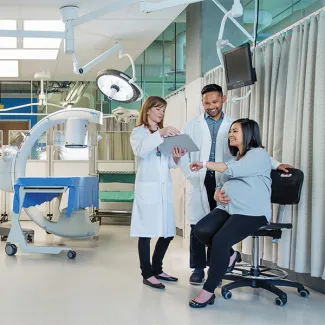Success Story: Nikko Asistio
The interdisciplinary nature of the MHLP made it very appealing to Nikko Asistio, who graduated in 2019 and currently works with the Fraser Health Authority as the clinical operations manager for two urgent and primary care centres in Surrey.

Health-care leaders must have a unique blend of skills. Guiding teams and delivering patient-centred initiatives requires clinical expertise along with strong skills in project management, communication and leadership.
The UBC Master of Health Leadership and Policy (MHLP) in Clinical Education was designed to meet this need by combining graduate courses in health care taught by leading researchers and practitioners from the UBC School of Nursing with courses on business and leadership through UBC Sauder’s Robert H. Lee Graduate School.
“The MHLP in Clinical Education program was developed out of an understanding that there is a real need for leaders who are well-versed in best practices in clinical education and equally comfortable with data collection and analysis, business strategy and project management,” says program director Cheryl Segaric. “We need people who can combine a big-picture vision with the practical ability to lead change within practice settings.”
The interdisciplinary nature of the MHLP made it very appealing to Nikko Asistio, who graduated in 2019 and currently works with the Fraser Health Authority as the clinical operations manager for two urgent and primary care centres in Surrey. He manages a staff of 50 that includes teams of physicians, nurse practitioners and allied health-care professionals and oversees all operations at the facilities.
Before entering the program, Nikko was a clinical redevelopment lead and had worked as an interim manager. That management experience underlined for him the importance of learning about the operational side of health care.
“My experience had been primarily patient-facing until that point,” he says. “I realized that as a manager I needed new tools and knowledge so that I could effectively run a unit or a centre – everything from how to develop workflows to best practices in project management.”
A grounding in clinical practice
The challenges within our health-care system are complex, requiring leaders with wide-ranging knowledge and an array of interdisciplinary skills. Students in the MHLP deepen their understanding of the care environment through courses on the theoretical foundations of clinical education, curriculum development, research and evidence-based practice, clinical nursing education, leadership in nursing and health, and health policy. They also complete a practicum. This broad focus enables graduates to lead clinical education and organizational operations across a range of clinical and educational settings.
“As a leader, you’re always an educator,” says Nikko. “Effective change management, for example, depends on educating your team about why change is happening and applying proven strategies to achieve goals.”
Nikko says that some of the skills he developed in clinical education came in very handy when he set up a COVID-19 testing clinic just two months into his new job, an experience that required him to quickly develop new workflows and tools to support his staff.
Strong leadership and project management skills
Leading complex projects and managing interdisciplinary teams requires skills in project management, communication, change management and leadership.
Students in the MHLP in Clinical Education learn these skills in business and leadership courses taught through UBC Sauder’s Robert H. Lee Graduate School, with classes on organizational leadership, project management, and leadership and sustainability. An intense four-week business boot camp introduces students to six core business competencies, from accounting and operations management to business case development, and students can also take an additional business course of their choosing.
“The business courses were invaluable training for my work as an operations manager, and I’m applying the knowledge I learned in them every day,” says Nikko. “Change management has been a big focus, given the context of COVID-19, and I’m drawing on tools and strategies I learned in the degree to share a vision of where we’re going and outline the paths for getting there. Taking the time to share information and communicate effectively ensures everyone is on the same page and working towards the same goal.”
A bridge between teams to deliver high-impact results
Through case studies, class discussions and group projects, the MHLP in Clinical Education gives health-care professionals the communication, collaboration and leadership skills to become the connecting link between stakeholders.
“As a frontline clinician, you are only exposed to clinical side of health care,” says Nikko. “My job title – clinical operations manager – is all about bringing together the clinical side with operations. I make sure the operations run smoothly – whether that’s getting new equipment or finding funds to hire on additional staff – so my staff can safely do their jobs, and the patients receive the best care possible.”
Nikko is committed to creating a team culture of connection and engagement. He’s achieving this through an inclusive leadership style that involves staff in the decision-making process. “I want my team to feel comfortable and to openly communicate with one another. I’m also confident having challenging conversations when those are needed.”
When asked about the value an MHLP graduate brings to an organization, Nikko says it’s all about the program’s dual focus. “I was on the fence about doing a master’s in education or a master’s in business, and this program gave me tangible skills in both.”
